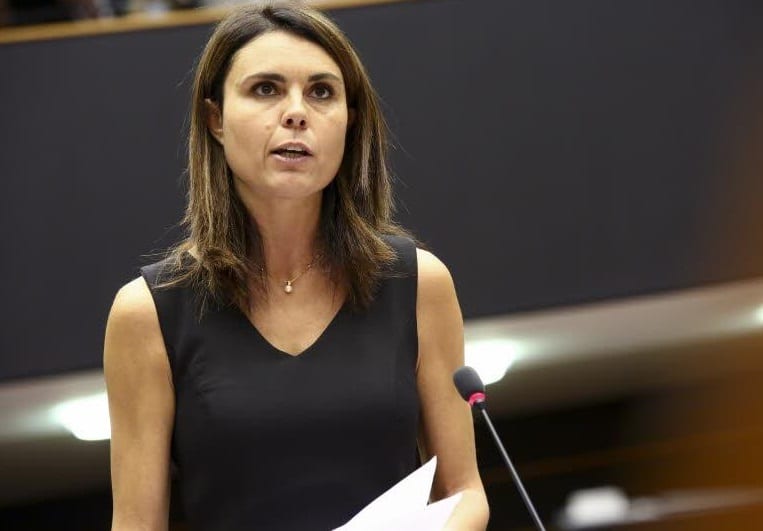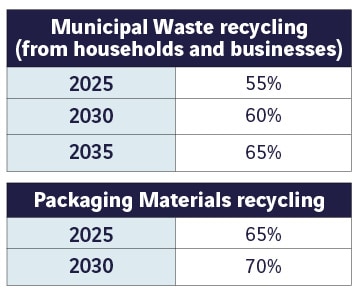And, even though the UK is to leave the European Union, the government has already said it is set to include the Circular Economy measures within EU policy, partly because they will have become EU law before the UK leaves.
The figures agreed today confirm developments in recent months and the main features of the package are:
- Municipal waste recycling target: 55% by 2025, 65% by 2035
- No more than 10% landfilling by 2035
- Separate collection of textiles and hazardous waste
In a statement, the European Parliament said that improving waste management will not only benefit the environment, climate, and human health. “The four pieces of legislation are also part of a shift in EU policy towards a circular economy, i.e. a system where the value of products, materials and resources is maintained in the economy for as long as possible.”
Targets
The text of the agreement, which has already been agreed with the EU Council of Ministers, is that by 2025, at least 55% of municipal waste (from households and businesses) should be recycled. The target will rise to 60% by 2030 and 65% by 2035. The definition of municipal waste includes material from small businesses and has been, and still is, a subject of discussion – often it is seen as applying to small high street or similar type businesses where waste may be collected by a local authority.
(Currently, the UK and local authorities are working to a 50% target by 2020 although this is not seen as being likely to be met by all authorities and senior local authoritiy figures have pointed out that it is not legally imposed on them. And, with the UK leaving the EU, it appears unlikely that the UK would face punitive measures from Brussels should it miss the 50% target.)
Packaging
The packaging waste element of the Circular Economy is important as it will put pressure on the UK’s packaging waste/PRN system to recover more material and so will have an impact on local authority services with packaging producers under pressure to help put more money towards local authority collections and publicity. Under the EU package, 65% of packaging materials will have to be recycled by 2025, and 70% by 2030. Separate targets are set for specific packaging materials, such as paper and cardboard, plastics, glass, metal and wood.
Landfill
A spokesman for the European Parliament explained that the draft law also limits the share of municipal waste being landfilled to a maximum of 10% by 2035. “In 2014, Austria, Belgium, Denmark, Germany, the Netherlands and Sweden sent virtually no municipal waste to landfill, whereas Cyprus, Croatia, Greece, Latvia and Malta still landfill more than three quarters of their municipal waste.”
Another significant feature for local authorities and waste management companies is the need for separate collections of some materials. The package requires that: “Textiles and hazardous waste from households will have to be collected separately by 2025. By 2024, biodegradable waste will also have to be either collected separately or recycled at home through composting.”

In terms of food waste, the Circular Economy package, said the spokesman, is in line with the UN sustainable development goals, member states should aim to reduce food waste by 30% by 2025 and 50% by 2030. In order to prevent food waste, member states should provide incentives for the collection of unsold food products and their safe redistribution. Consumer awareness of the meaning of “use by” and “best before” label dates should also be improved, say MEPs.
Environmental protection
“With this package, Europe is firmly committed to sustainable economic and social development, which will at last integrate industrial policies and environmental protection”, said lead MEP Simona Bonafè (S&D, IT). “The circular economy is not only a waste management policy, but is a way to recover raw materials and not to overstretch the already scarce resources of our planet, also by profoundly innovating our production system”.
“This package also contains important measures on waste management, but at the same time goes further, by defining rules taking into account the entire life cycle of a product and aims to change the behaviour of businesses and consumers. For the first time, Member States will be obliged to follow a single, shared legislative framework”, she added.
Next steps
The text now goes back to Council for formal approval before publication in the Official Journal of the EU, the official record of all EU legal acts.
What is a circular economy?
The EU considers a circular economy as implying a reduction of waste to a minimum as well as re-using, repairing, refurbishing and recycling existing materials and products. Moving towards a more circular economy will reduce pressure on the environment, enhance security of supply of raw materials, increase competitiveness, innovation and growth, and create jobs.












Subscribe for free